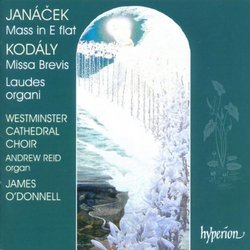An interesting showcase
Mark Swinton | 07/05/2000
(4 out of 5 stars)
"This is the last recording made for Hyperion by Westminster Cathedral Choir under James O'Donnell. It is quite an interesting combination of works to say the least.Most of the programme is given over to the Hungarian composer Zoltan Kodaly. The opening "Missa Brevis" is a remarkable work - it has a fine sense of melody and a tonal language that is at times unpredictable but nonetheless bearable if you're used to Mozart or Haydn or Schubert. There are some really haunting moments here - the austere and lyrical opening of the "Kyrie" gives way to a passage for trebles and high organ accompaniment of the most radiant quality, including some unbelievably quiet top Cs! By contrast, such movements as the "Gloria" and "Credo" manage to be joyful but at the same time rather staid. As the work draws to a conclusion, the contemplative and ethereal mood returns. It is not hard to imagine this in liturgical performance.The centre of the programme is taken up by an unusual cantata, "Laudes Organi," in which Kodaly sets an ancient Latin poem extolling the use of instruments (especially the organ) in worship, as well as offering praise for the makers of such instruments. The harmonic language of the Mass is also evident in this much more exuberant work, although for some reason I find myself taking it with a pinch of salt; it doesn't come across as convincingly as the Mass, although in its own right it is well-written.The disc concludes with a very special 'new' work: the "Mass in E flat" by Leos Janacek. This has often been referred to as the "Unfinished Mass" and has been a topic of interest to musicologists and Janacek scholars for many years - it is known that he wrote it as a study model for his composition pupils who sought to write short mass settings, and that the work was a prototype for the celebrated "Glagolitic Mass." There have now been at least two attempts to reconstruct the original sketches of the "Unfinished Mass," and the version recorded here is the most recent, made by musicologist Paul Wingfield (who describes the process in an informative booklet note). This is an interesting glimpse at Janacek's style: he had no religious convictions whatsoever and it certainly shows in places (the lack of a "Gloria" and the formal, almost stiff construction of the "Agnus Dei" are obvious examples). Nonetheless, like the Kodaly, one can imagine parts of this being performed in liturgical offerings, and it appears that Westminster Cathedral Choir are the first to try it out in that way.This is certainly an interesting showcase of the now-legendary musicianship at the Cathedral. The daunting expressionism of the Kodaly Mass is ably met by the boys, a testament to James O'Donnell's choir training abilities, and the balance of voices throughout the rest of the programme is admirable. What is particularly arresting about the programme, however, is the performance of the Cathedral's sub-organist Andrew Reid. Each of the three works includes substantial passages for organ: the Kodaly Mass begins and ends with movements for organ alone; "Laudes Organi" naturally takes an opportunity to milk the resources of the organ (and test the stamina of its player!) and the Janacek Mass calls for some remarkably flambuoyant playing, particularly in the "Sanctus." Because of this, I feel that the disc is more of a presentation of the Westminster Cathedral organ that of the choir - not that there's anything wrong with that...This is perhaps not a disc for you if you like your sacred music pure and unsullied. Still, it is an interesting and well-executed performance, worthy of anything else offered by James O'Donnell and his forces in the past."
Heart-warming lonliness
Samuel Stephens | TN, USA | 11/12/2007
(5 out of 5 stars)
"Kodaly's two sacred works here are of the same mould, and both are masterpieces.
There is something about this music that will make you feel lonely, and will warm your heart at the same time. It's a strange feeling that I have only experienced with this music.
So what is the music like?
It is music written for chorus and organ. The organ plays a dominant role, but you should keep in mind that it is more for mood-setting and transitioning. This isn't flashy Bach Toccata and Fugue stuff. In fact, this music doesn't really reach beyond a normative mood for church music. What it reminds me of--and what you should keep in mind as well---is the music of the Renaissance. The old masters' names come to mind, even though the style is Kodaly. It's as if Kodaly had transported himself back in time and written--more or less--in the way that Josquin or Palestrina did, with the same set of ideals in mind.
The atmosphere of this music is somewhat chilly as the CD cover suggests. But it is not a depressing chilliness...this is wondrous, uplifting, and masterful music that evokes everything good there is about church music. The direction of the music is pretty straight-forward: Kodaly doesn't try to fancy up the phrasing of the words with slick devices...but at the same time, he doesn't go down the Path of Sugary Immediacy.
That being said, it might take some repeated listening to get inside the music. For people like me--who are used to the adventurous scores of Romantic and post-Romantic composers (including Kodaly), this will be a tough nut to crack. I encourage listening to the CD by yourself, with the volume up.
For those immersed in older music: Mediaval and Renaissance, this music should be immediately listenable and accessible.
Fully recommended, with a push of encouragement towards repeated listening.
Postscript: I am truly perplexed at the high price for this single disc. I bought it NEW in Oregon for only eight dollars."

